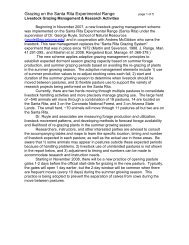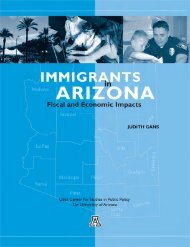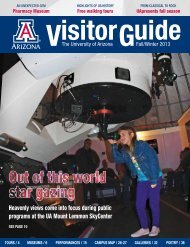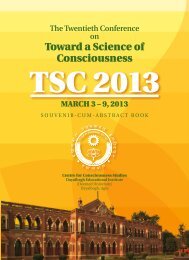CONSCIOUSNESS
Download - Center for Consciousness Studies - University of Arizona
Download - Center for Consciousness Studies - University of Arizona
- No tags were found...
Create successful ePaper yourself
Turn your PDF publications into a flip-book with our unique Google optimized e-Paper software.
208 6. Culture and the Humanities<br />
contribute peripherally to the conference themes of mind wandering, unconscious processing,<br />
body consciousness and self and transformation. I have presented the bulk of the sequence at<br />
a conference held by the Irish Astrological Association, and was pleased to receive general approbation<br />
for the relevance of the material and the appropriateness of the sequential arrangement.<br />
I am an Irish poet with four well-received published collections. In Ireland I am well<br />
known for my dramatic performances, and I have also performed in Great Britain, Europe and<br />
the U.S. I have written three novels, containing themes of altered states, confused perceptions<br />
and emotional disturbance. I have just completed the first book in a planned four-volume story<br />
for teenagers, the premise of which is that we create an immaterial, but real world with our<br />
thoughts. My interest in the subject of consciousness arises from my own confusions about<br />
reality, perception and notions of the true. I am also engaged by the subjects of free will and<br />
guilt. The astrological chart would seem to deny free will, as does my life experience. I seek<br />
the science. My website is at (www.maighreadmedbh.ie) “Maighread Medbh is well known as<br />
a unique performance poet. Her combination of verbal panache, vital delivery, iconoclasm and<br />
incisiveness has been much remarked.” (Nessa O’Mahony, poet, Dublin) S3<br />
6.1 Literature and hermeneutics<br />
317 The Contemporary Neurological Narrative in Fiction and Autobiography (English<br />
and French Speaking Literatures) Herve Lambert (Faculty<br />
Of Humanities, Kyushu University, Fukuoka, Japan)<br />
Relations between literature and neurology are almost consubstantial since Charcot’s<br />
enormous influence. Some writers related autobiographical aspects of neurological syndromes<br />
and epilepsy has been the most described neurological syndrome in literature. On the other<br />
side, neurologists like the Russian Luria, Oliver Stacks’ model, wanted to keep on presenting<br />
neurological cases with a literary style inherited from the XIXth century masters. Today with<br />
neurosciences expansion, literature shows a neurological turn and a special interest for neurological<br />
syndromes. Knowledge about synesthesia dramatically improved in the last years and<br />
a lot of novels narrate the transformation of what had been previously endured as a hidden<br />
condition. Capgras syndrome is the theme of Richard Powers’s The Echomaker Autism is the<br />
theme of Mark Haddon’s Curious Incident of the Dog in the Night-Time, Tourette?s syndrome<br />
is the theme of Jonathan Lethem’s Motherless Brooklyn. We could also mention McEwan’s<br />
Saturday about Huntington’s disease, Rivka Galchen’s Atmospheric Disturbances about Capgras<br />
syndrome again, etc. Besides fictional narratives with neurological themes, exists a new<br />
trend of autobiographical texts about neurological conditions, like with Patricia Lynne Duffy’s<br />
Blue Cats and Chartreuse Kittens for synesthesia or with Daniel Tammett about autism (and<br />
hypermnesia and synesthesia also!), or with Boris Cyrulnik about resilience, or Annie Ernaux<br />
about Alzheimer, among other examples.This paper would like to draw a conceptual map of<br />
the contemporary relations between neurology and neurogical fictional and autobiographical<br />
narratives. This paper would like to draw a conceptual map of the contemporary relations<br />
between neurology and neurogical fictional and autobiographical narratives. P12<br />
318 Science Fiction and Consciousness Robert J. Sawyer <br />
(Mississauga, Ontario Canada)<br />
Robert J. Sawyer’s bestselling science-fiction novels have long explored issues of consciousness.<br />
In this keynote, Sawyer will discuss the models of and theories about consciousness<br />
he’s variously employed in novels such as FlashForward (and the ABC TV series based<br />
on it, for which he is consultant and a scriptwriter), in which the consciousness of all human<br />
beings is displaced forward in time for a period of two minutes; Mindscan, in which consciousness<br />
is digitized and uploaded; Hominids, in which true self-aware consciousness arises<br />
in Neanderthals; The Terminal Experiment, in which a biomedical engineer records the final<br />
cessation of consciousness at death; Factoring Humanity, in which a technology is developed<br />
that allows surfing of the collective unconscious; and his current WWW trilogy of Wake,<br />
Watch, and Wonder, about the spontaneous emergence of consciousness in the World Wide<br />
Web. Sawyer is one of only seven writers in history to win all three of the science-fiction







